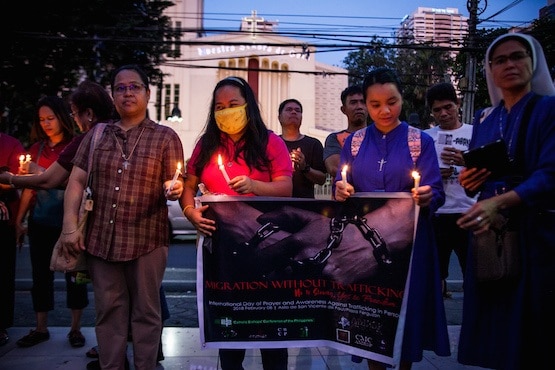Michelle thought her prayers had been answered when she accepted a job as a domestic worker in Saudi Arabia last year. Finally, she thought, she had a way out of poverty.
Instead, Michelle found herself being flown not to the capital of Riyadh — as stated in her contract — but to Jeddah, where she was forced to work for 15 hours a day with little sleep. When she finally managed to escape and seek shelter at the Philippine Embassy in Riyadh, her employer came with the police to arrest her.
Michelle spent a few days in jail before her abusive employer sold her to another Saudi national for US$20,000.
She says she is now even worse off as she has to clean the houses of her employer’s relatives on top of her normal duties. And her male boss had made sexually suggestive advances by asking Michelle to give him massages.
UCA News reports:
When Michelle’s mother, Grace, learned of her daughter’s plight, she sought help from a foreign affairs official in Manila. She demanded her daughter be repatriated for her own safety.
The official promised to help. But now a month has passed and there has been no word from the authority, she said.
Mary Girlie Glen Tupas of the International Justice Mission, a group that has been assisting victims of human trafficking, said the Philippines is a fertile ground for traffickers.
“The victims mostly come from poor families that are easily convinced by recruiters in exchange for money and promises,” said Tupas.
She noted that among the sources of human trafficking are tribal communities and areas hit by conflict and natural disasters.
The Philippines has, nonetheless, been ranked in Tier 1 of the U.S. Global Trafficking in Persons Report for the past two years. It is the first Southeast Asian country to ever be ranked in Tier 1, which means the country has fully met the minimum standards of the Trafficking Victims Protection Act of the U.S. government.
Still, officials say the country struggles to protect its migrant workers abroad, both because of a “lack of manpower and expertise in combating trafficking.”
Bishop Ruperto Santos, head of the Episcopal Commission on the Care of Migrants and Itinerant People, added that “Our first act should always be to prevent persons from being illegally and falsely recruited. The next step is education on human rights and the prosecution of human traffickers.”







Freedom United is interested in hearing from our community and welcomes relevant, informed comments, advice, and insights that advance the conversation around our campaigns and advocacy. We value inclusivity and respect within our community. To be approved, your comments should be civil.